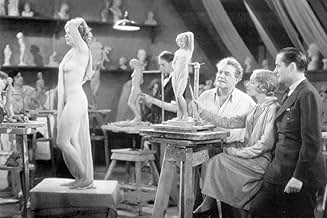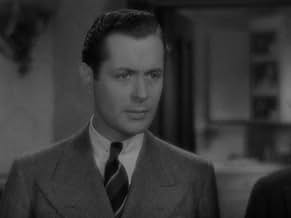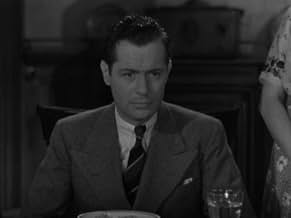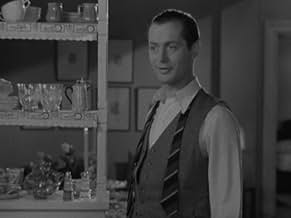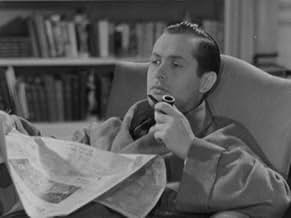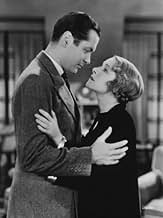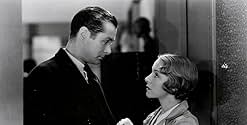Una recién casada descubre que ella y la familia presumida de su esposo hablan diferentes idiomas.Una recién casada descubre que ella y la familia presumida de su esposo hablan diferentes idiomas.Una recién casada descubre que ella y la familia presumida de su esposo hablan diferentes idiomas.
- Dirección
- Guionistas
- Elenco
- Premios
- 3 premios ganados en total
Julia Bejarano
- Umbrella Peddler
- (sin créditos)
William Farnum
- C. Forrester
- (sin créditos)
Sherry Hall
- Purser
- (sin créditos)
Opiniones destacadas
Rose Franken, now forgotten, was an estimable playwright of the first half of the 20th century, one of the very few women to reliably write Broadway hits. This is one such hit, a 1932 drama faithfully filmed with much of the original cast, with dialog neatly refashioned by two of MGM's best screenwriters, Herman Mankiewicz and Donald Ogden Stewart. Franken wrote particularly well about family dynamics, and that's pretty much all this is, the story of young marrieds threatened by the groom's unquestioning domination by a catty, conservative family, most especially his horror of a mother, well played by Louise Closser Hale. He's not an especially likable hero, often petty, self-centered, and domineering toward his wife, and Montgomery isn't afraid to emphasize his less attractive traits. So Helen Hayes is left to suffer quietly, trying to maintain her composure as his relatives mercilessly nitpick at her, and crushed every time she attempts to fight back. Hayes is, as usual, sexless, but she effectively catches this woman's desperation, and she partners well with John Beal, quite touching as the nephew who falls in love with her. (What happens to him? After his final exit, I expected to hear an offstage gunshot.) It's economical, swift storytelling, with a bunch of good character actors in support, and their portrayals, thanks largely to the writing, are well-rounded-- nobody's totally awful, except Louise Closser Hale's grasping mama.
There's a good film hiding within "Another Language," but it's overshadowed by an overwrought plot and, most significantly, an unsympathetic central character.
The plot concerns Stella (Helen Hayes), a newlywed whose husband Victor (Robert Montgomery) is blind to his family's boorish behavior and their immediate dislike of his new bride. Worst in the bunch is his smothering mother (Louise Closser Hale), whose reaction in every scene is to pretend to be ill to gain her sons' sympathy. Why none of her stupid children see through her manipulative behavior boggles the mind. Victor (or as his family annoyingly calls him, Vicki) is the most frustrating character in the film. He takes his family's side whenever a conflict arises and treats his wife not only like a stranger, but with disdain. It's a mystery as to what Stella ever saw in him and for that matter, why she hasn't walked out on him. There's also a subplot involving Victor's nephew who falls in love with Stella that is never fully developed, nor is it resolved to a satisfying conclusion.
Another weakness, as someone else pointed out, is that the one family member who shows any compassion toward Stella is Victor's father (Henry Travers), yet he never stands up to his wife or any of the other relatives who are always attacking Stella.
Hayes is acceptable in her role, but it's easy to see why she never became a successful film star. Whatever magic she had on stage doesn't translate to the screen. Her acting is sometimes mannered and she doesn't have a face the camera would fall in love with. She isn't helped by Montgomery, who is just so unlikeable in this film. The two have zero chemistry.
Louise Closser Hale fares better as Mrs. Hallam, the mother-in-law from hell. The standout, though, is Margaret Hamilton in her film debut as one of Stella's sisters-in-law. Though bitchy most of the time, she does show some humanity in the final reels and is the only truly believable member of the family. The movie is only worth sitting for through the performance of this consummate character actor. It's like she's speaking another language compared to the rest of the cast.
The plot concerns Stella (Helen Hayes), a newlywed whose husband Victor (Robert Montgomery) is blind to his family's boorish behavior and their immediate dislike of his new bride. Worst in the bunch is his smothering mother (Louise Closser Hale), whose reaction in every scene is to pretend to be ill to gain her sons' sympathy. Why none of her stupid children see through her manipulative behavior boggles the mind. Victor (or as his family annoyingly calls him, Vicki) is the most frustrating character in the film. He takes his family's side whenever a conflict arises and treats his wife not only like a stranger, but with disdain. It's a mystery as to what Stella ever saw in him and for that matter, why she hasn't walked out on him. There's also a subplot involving Victor's nephew who falls in love with Stella that is never fully developed, nor is it resolved to a satisfying conclusion.
Another weakness, as someone else pointed out, is that the one family member who shows any compassion toward Stella is Victor's father (Henry Travers), yet he never stands up to his wife or any of the other relatives who are always attacking Stella.
Hayes is acceptable in her role, but it's easy to see why she never became a successful film star. Whatever magic she had on stage doesn't translate to the screen. Her acting is sometimes mannered and she doesn't have a face the camera would fall in love with. She isn't helped by Montgomery, who is just so unlikeable in this film. The two have zero chemistry.
Louise Closser Hale fares better as Mrs. Hallam, the mother-in-law from hell. The standout, though, is Margaret Hamilton in her film debut as one of Stella's sisters-in-law. Though bitchy most of the time, she does show some humanity in the final reels and is the only truly believable member of the family. The movie is only worth sitting for through the performance of this consummate character actor. It's like she's speaking another language compared to the rest of the cast.
Another Language from 1933 stars Robert Montgomery, Helen Hayes, John Beal, and Louise Closser. Directed by Edward H. Griffith.
Montgomery and Hayes are Victor and Stella, who fell in love in Europe and eloped. After meeting his family back in the states, she gradually realizes that he's basically smothered by their closeness, and they all dance to the tune of their mother (Closser). She's very manipulative, the type who becomes ill whenever Victor and Stella want to leave town. The family finds Stella upper class and make annoying remarks couched as jokes.
(Note: Robert Taylor's mother was like this. The story is she went on the Taylor/Stanwyck honeymoon-untrue. She delayed it by becoming ill. Barbara referred to her as "that miserable b--.")
To make matters worse, Victor's nephew Jerry (Beal), who is not like the rest of the family, falls for Stella.
Victor needs to stand up for himself and Stella. Will he?
Good film. The cast, which also includes Margaret Hamilton, is very good. She and Beal repeat their Broadway roles. Hayes is lovely as the free-spirited wife who adores her husband but also likes to take art class twice a week.
I met John Beal many years ago. He was a lovely man who had a lot of success on Broadway. As a young leading man, he had a great start in films; postwar he worked more on stage.
Apparently, Norma Shearer was supposed to play the lead, but her husband, Irving Thalberg, had a heart attack, and she decided to stay home.
Montgomery and Hayes are Victor and Stella, who fell in love in Europe and eloped. After meeting his family back in the states, she gradually realizes that he's basically smothered by their closeness, and they all dance to the tune of their mother (Closser). She's very manipulative, the type who becomes ill whenever Victor and Stella want to leave town. The family finds Stella upper class and make annoying remarks couched as jokes.
(Note: Robert Taylor's mother was like this. The story is she went on the Taylor/Stanwyck honeymoon-untrue. She delayed it by becoming ill. Barbara referred to her as "that miserable b--.")
To make matters worse, Victor's nephew Jerry (Beal), who is not like the rest of the family, falls for Stella.
Victor needs to stand up for himself and Stella. Will he?
Good film. The cast, which also includes Margaret Hamilton, is very good. She and Beal repeat their Broadway roles. Hayes is lovely as the free-spirited wife who adores her husband but also likes to take art class twice a week.
I met John Beal many years ago. He was a lovely man who had a lot of success on Broadway. As a young leading man, he had a great start in films; postwar he worked more on stage.
Apparently, Norma Shearer was supposed to play the lead, but her husband, Irving Thalberg, had a heart attack, and she decided to stay home.
Trouble with the in laws? Try spending an hour and fifteen minutes with the Hallam clan. I guarantee that they'll make your spouse's folks look delightfully eccentric. In other words, this is a wonderful study in reverse snobbery (The Hallams think their son's wife is "high hat" while it is they who act superior), casual social cruelty (the constant digs, disguised as offhand remarks, at the daughter in law's dress and manner and way of life), and sheer annoyance, from the constant stream of banal gossip to the mother in law's strategic fainting to the brother in law's stupid jokes and even lamer pranks.
So, great social satire that, in the hands of two of 1930 and 40s Hollywood's best scribes, Herman Mankewiecz and Donald O Stewart, at times rivals Sinclair Lewis or Kaufman/Hart. And the performances aint bad, either. Especially good are Louise Closser Hale as the long suffering (and doesn't she let you know it!) matriarch of the Hallams, Henry Travers as her weak but much nicer husband, Margaret Hamilton as the wasp tongued, faintly sympathetic sister in law and Hal K Dawson as the brother in law you'd love to punch (surprised it didn't happen). As the married couple who must put up with the above Robert Montgomery and Helen Hayes are fine, especially Hayes in one of her more restrained acting turns. The only performance that strikes me as wooden or clunky is that of John Beal as the rebellious, artistic nephew, but then he is given the flattest of Mank and Stewart's otherwise sharp dialogue. Biggest weakness in the film, though, is neither the writing nor the acting but director Edward Griffith's inability to seem to have any idea that there is such a thing as visual comedy. (i.e. Film's fairly stiff/stagey). Give it a B.
So, great social satire that, in the hands of two of 1930 and 40s Hollywood's best scribes, Herman Mankewiecz and Donald O Stewart, at times rivals Sinclair Lewis or Kaufman/Hart. And the performances aint bad, either. Especially good are Louise Closser Hale as the long suffering (and doesn't she let you know it!) matriarch of the Hallams, Henry Travers as her weak but much nicer husband, Margaret Hamilton as the wasp tongued, faintly sympathetic sister in law and Hal K Dawson as the brother in law you'd love to punch (surprised it didn't happen). As the married couple who must put up with the above Robert Montgomery and Helen Hayes are fine, especially Hayes in one of her more restrained acting turns. The only performance that strikes me as wooden or clunky is that of John Beal as the rebellious, artistic nephew, but then he is given the flattest of Mank and Stewart's otherwise sharp dialogue. Biggest weakness in the film, though, is neither the writing nor the acting but director Edward Griffith's inability to seem to have any idea that there is such a thing as visual comedy. (i.e. Film's fairly stiff/stagey). Give it a B.
A marvelous movie, from start to (just before the) finish.
We meet Robert Montgomery and Helen Hayes, with whom he has eloped recently, on shipboard. She is eager to start their home life together. All he can think of is seeing his mother.
Louise Closser Hale is superb as the suffocating matriarch of his family. The other members, including Henry Travers and Margaret Hamilton, are very good as well. Especially fine is John Beal, as Montgomery's nephew. Indeed, he gives a heart-wrenching performance. It's possibly the best in this movie and he is working against very stiff competition.
Montgomery is not only a mama's boy -- called Vicky by everyone, as his name is Victor. He is also a supreme narcissist: In one shocking scene, he inspects himself in a mirror over the mantel. Directly under the mirror is a plaster bust of him that Hayes has lovingly worked on sculpting. He doesn't even notice it.
It's very hard to fault this movie. The ending is a trifle disappointing. And a Mark Twain aphorism is spoken by one character and laughed at by others, as if it were original to this screenplay.
Hayes is superb and very likable. Montgomery, not generally a favorite of mine, is believable as her self-centered husband. Beal is absolutely superb in a very touching role. And Hale is subtle but compelling as the woman of iron who becomes an invalid the minute doing so will get what she wants from her offspring.
We meet Robert Montgomery and Helen Hayes, with whom he has eloped recently, on shipboard. She is eager to start their home life together. All he can think of is seeing his mother.
Louise Closser Hale is superb as the suffocating matriarch of his family. The other members, including Henry Travers and Margaret Hamilton, are very good as well. Especially fine is John Beal, as Montgomery's nephew. Indeed, he gives a heart-wrenching performance. It's possibly the best in this movie and he is working against very stiff competition.
Montgomery is not only a mama's boy -- called Vicky by everyone, as his name is Victor. He is also a supreme narcissist: In one shocking scene, he inspects himself in a mirror over the mantel. Directly under the mirror is a plaster bust of him that Hayes has lovingly worked on sculpting. He doesn't even notice it.
It's very hard to fault this movie. The ending is a trifle disappointing. And a Mark Twain aphorism is spoken by one character and laughed at by others, as if it were original to this screenplay.
Hayes is superb and very likable. Montgomery, not generally a favorite of mine, is believable as her self-centered husband. Beal is absolutely superb in a very touching role. And Hale is subtle but compelling as the woman of iron who becomes an invalid the minute doing so will get what she wants from her offspring.
¿Sabías que…?
- TriviaModern sources state that Helen Hayes replaced Norma Shearer in the lead after Shearer decided to stay at home and nurse her husband, Irving Thalberg, who had suffered a serious heart attack.
- ErroresWhen Sally is pouring coffee for Victor, she gets distracted and spills some - it splashes out of the saucer and onto the tablecloth. However, in the next shot where she switches cups with Victor, there is no evidence of the spilled coffee on the tablecloth.
- Citas
Mother Hallam: [Victor has left the house against his mother's wishes] Victor! Come back here!
[she swoons]
Pop Hallam: Don't bother to faint, Mom, he can't see you.
Mother Hallam: [suddenly alert, and very irritated] Shut up!
- Créditos curiososIn the beginning credits portraits of the actors who portray the main characters are shown with a hand flipping through a photo album of the Hallam Family.
- ConexionesFeatured in This Side of Heaven (1934)
- Bandas sonorasThe Wedding of the Painted Doll
(uncredited)
Music by Nacio Herb Brown
Lyrics by Arthur Freed
Played on the Victrola
Selecciones populares
Inicia sesión para calificar y agrega a la lista de videos para obtener recomendaciones personalizadas
Detalles
Taquilla
- Presupuesto
- USD 272,297 (estimado)
- Tiempo de ejecución1 hora 17 minutos
- Color
- Relación de aspecto
- 1.37 : 1
Contribuir a esta página
Sugiere una edición o agrega el contenido que falta

Principales brechas de datos
By what name was Another Language (1933) officially released in India in English?
Responda
